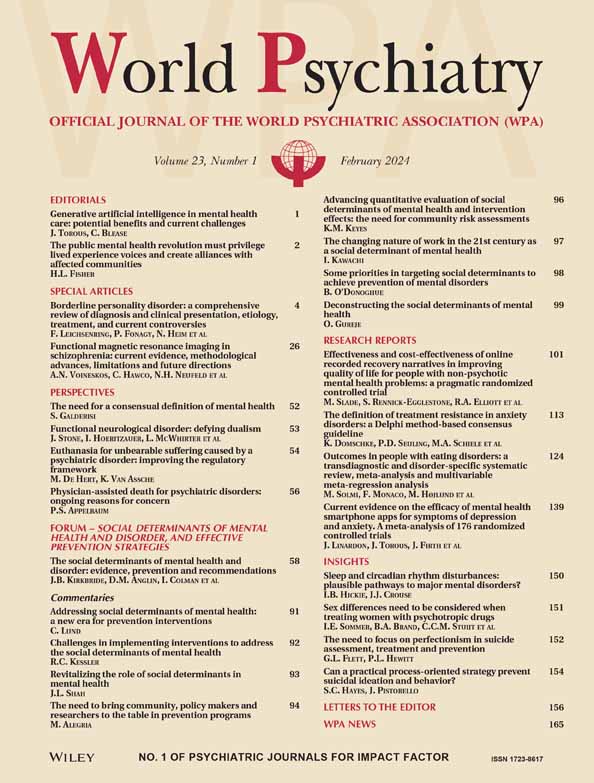来自资源贫乏环境的视角
IF 65.8
1区 医学
Q1 PSYCHIATRY
引用次数: 5
摘要
对特定药物效果的关注,以及对精神药物对SMI患者身体健康可能产生的影响的更多关注,可以帮助精神科医生选择合适的治疗方法。初级保健提供者也是如此。一些初级保健专业人员对这一弱势群体持负面态度,或错误地将身体疾病的体征和症状归因于并发的精神障碍,导致对身体状况的诊断不足和虐待。这些提供者似乎仍然缺乏意识,即SMI患者患心脏病、肥胖和糖尿病等身体疾病的风险更大。初级保健提供者也可能不了解与精神药物相关的健康风险以及由此产生的SMI患者健康监测。因此,他们应该接受专门的培训,以识别和治疗SMI患者的身体健康问题。很明显,由于文化和教育因素以及服务提供者的角色和责任不明确,SMI患者的护理不足,继续使许多SMI服务用户容易受到严重的身体健康问题的影响,这可能会限制他们的康复。我们可以通过教育创新来改变这些方面。只有这样,我们才能离开柴郡猫的道路,刘等人提出的多层次干预或策略是否会改善SMI患者的预后。本文章由计算机程序翻译,如有差异,请以英文原文为准。
Perspectives from resource poor settings
edge about specific medication effects and greater attention to the possible impact of psychotropic medications on the physical health of people with SMI can aid psychiatrists in selecting appropriate treatment. The same is true for primary care providers. Some primary care professionals hold negative attitudes toward this vulnerable group, or wrongly attribute physical illness signs and symptoms to concurrent mental disorders, leading to underdiagnosis and mistreatment of the physical conditions. It seems that there still is a lack of awareness among these providers that people with SMI face a greater risk of developing physical illnesses, such as heart disease, obesity and diabetes. Primary care providers may also not be knowledgeable about the health risks associated with psychotropic medications and the resulting health monitoring that is indicated for persons with SMI. They therefore should specifically be trained to identify and treat physical health problems in people with SMI. It is clear that deficiencies in the care of those with SMI, due to cultural and educational factors and unclear roles and responsibilities of their providers, continue to leave many service users with SMI vulnerable to serious physical health issues, which may limit their recovery. We can change these aspects through educational innovations. Only then we can leave the road of Cheshire cat and will multilevel interventions or strategies, as those proposed by Liu et al, result in improved outcomes for people with SMI.
求助全文
通过发布文献求助,成功后即可免费获取论文全文。
去求助
来源期刊

World Psychiatry
医学-精神病学
自引率
7.40%
发文量
124
期刊介绍:
World Psychiatry is the official journal of the World Psychiatric Association. It is published in three issues per year.
The journal is sent free of charge to psychiatrists whose names and addresses are provided by WPA member societies and sections.
World Psychiatry is also freely accessible on Wiley Online Library and PubMed Central.
The main aim of World Psychiatry is to disseminate information on significant clinical, service, and research developments in the mental health field.
The journal aims to use a language that can be understood by the majority of mental health professionals worldwide.
 求助内容:
求助内容: 应助结果提醒方式:
应助结果提醒方式:


